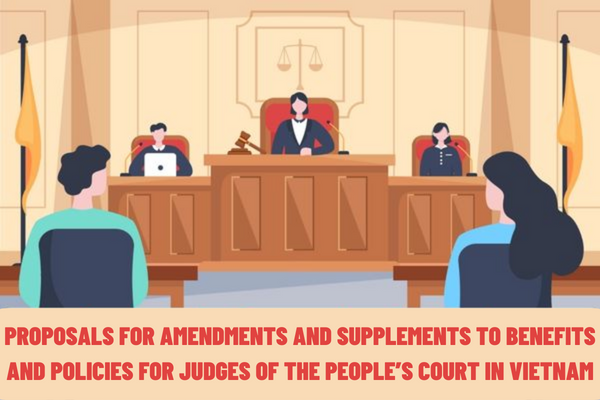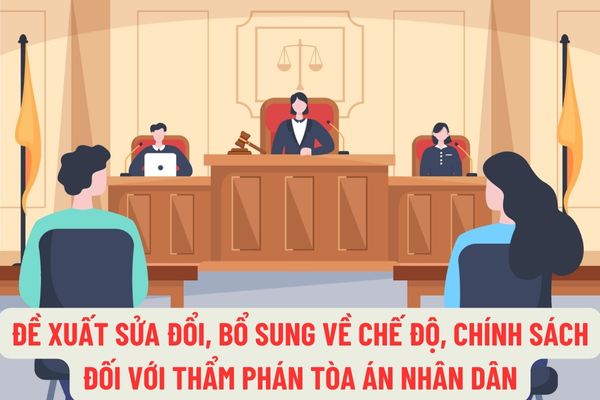What are the proposals for amendments and supplements to benefits and policies for judges of the People’s Court in Vietnam?
What are the proposals for amendments and supplements to benefits and policies for judges of the People’s Court in Vietnam?
Pursuant to Article 108 of the Draft Law amending and supplementing a number of articles of the Law on Organization of People’s Courts in Vietnam, amending and supplementing benefits and policies for judges of the People’s Court as follows:
- The salary system and policies for judges of the People’s Court shall be regulated by the State in accordance with the particularity of the adjudication work.
- Judges of the People’s Court are guaranteed to respect their honor and prestige; protected when performing official duties and in case of necessity. Acts of obstructing, threatening or infringing upon the life, health, honor and dignity of judges of the People’s Court and relatives of judges of the People’s Court are strictly prohibited.
- To enjoy the policy of people with meritorious services in case of loss of health and life due to the reason of performing official duties.
- To enjoy immunity according to the provisions of this law.
- Judges are trained and retrained to improve their court qualifications and skills.
- Judges shall be honored and commended in accordance with the law on emulation and commendation.
- Judges are granted uniforms and Judge ID cards to perform their duties.
- Salary regime and policies; dress samples, allocation and use of costumes, and Judge identification cards shall be prescribed by the National Assembly Standing Committee at the proposal of the Chief Justice of the Supreme People’s Court.

What are the proposals for amendments and supplements to benefits and policies for judges of the People’s Court in Vietnam? (Image from the Internet)
What are the proposals to amend the regulations on the duties and powers of judges in Vietnam?
Pursuant to Article 87 of the Draft Law amending and supplementing a number of articles of the Law on Organization of People’s Courts in Vietnam, stipulating the duties and powers of Judges of the People’s Court, specifically amending and supplementing according to regulations. Specifically, the duties and powers of the Judge are as follows:
- Defending justice, protecting human rights and citizens’ rights, protecting the socialist regime, protecting the interests of the State, and the legitimate rights and interests of agencies, organizations and individuals.
- Trial of criminal and administrative cases; settle and adjudicate civil, marriage and family, business, commercial, labor and bankruptcy cases.
- Trial of administrative violations according to the provisions of law.
- Consider and decide to apply measures to handle administrative violations at the People’s Court.
- Consider and decide to send drug addicts from full 12 to under 18 years old to compulsory detoxification establishments.
- Consider and decide on a number of issues related to human rights and citizens’ rights in accordance with the law.
- Consider and decide on legal documents contrary to the Constitution, laws and resolutions of the National Assembly; ordinances and resolutions of the National Assembly Standing Committee at the request of competent agencies, organizations and individuals as prescribed by law.
- To consider and conclude on the legality of procedural acts and decisions of investigators, procurators and lawyers during the course of investigation, prosecution and trial; consider the application, change or cancellation of the containment measure; suspend or suspend the case.
- Develop case precedents and guiding documents for uniform application of law in trial.
- Examine and conclude on the legitimacy of evidences and documents collected by investigating bodies, investigators, procuracies, and procurators; provided by the lawyer, the accused, the defendant and other participants in the proceedings.
- When deeming it necessary, return the dossier to request the Procuracy for additional investigation; request the Procuracy to supplement documents and evidences in accordance with the Criminal Procedure Code.
- To request investigators, procurators and others to present matters related to the case at the court hearing; prosecute a criminal case if it is discovered that a crime has been omitted.
- Verify and collect documents and evidences to settle civil, marriage and family, business, commercial, labor, administrative cases and exercise other powers according to the provisions of the procedural law.
- To fully, objectively and comprehensively consider documents and evidences collected during the proceedings; based on the results of the litigation, issue judgments and decisions on guilt or innocence, application or non-application of penalties, judicial measures, decisions on property rights and obligations, and moral rights.
- Issue decisions on execution of criminal judgments, postponement of imprisonment, temporary suspension of serving of imprisonment sentences, reduction or exemption from serving sentences, remission of criminal records, exemption from or reduction of judgment enforcement obligations for collection paying for the state budget; exercise other powers as prescribed by the Penal Code, the Law on Criminal Judgment Execution, and the Law on Civil Judgment Execution.
Issue decisions to postpone, exempt, reduce or temporarily suspend the execution of administrative handling measures applied by courts.
- Researching cases to serve the adjudication of the Council of Judges and the Committee of Judges.
- Carrying out application processing.
- To perform other tasks and exercise other powers as prescribed by law.
What are the proposals to supplement immunity to Judges of the People’s Court?
Pursuant to Article 110 of the Draft Law amending and supplementing a number of articles of the Law on Organization of People’s Courts in Vietnam, the provisions on immunity of judges have been supplemented in the following directions:
- Not to arrest, detain, detain, prosecute or search the residence and workplace of judges of the Supreme People’s Court without the consent of the National Judicial Council. The request for arrest, detention, custody, prosecution and search of the residence and workplace of the Judge of the Supreme People’s Court falls under the competence of the Chief Procurator of the Supreme People’s Procuracy.
- Not to arrest, detain, detain, prosecute or search the residence and workplace of the judge or reserve judge without the consent of the Chief Justice of the Supreme People’s Court.
- In case a judge of the People’s Court is held in custody for a red-handed crime, the custody agency must immediately notify the Chief Justice of the Supreme People’s Court for consideration and decision.
- To be exempt from liability when issuing judgments or decisions in accordance with the order and procedures prescribed by law but with errors that are not intentional.
View the entire Draft Law amending and supplementing a number of articles of the Law on Organization of People’s Courts in Vietnam: Click here.
LawNet
